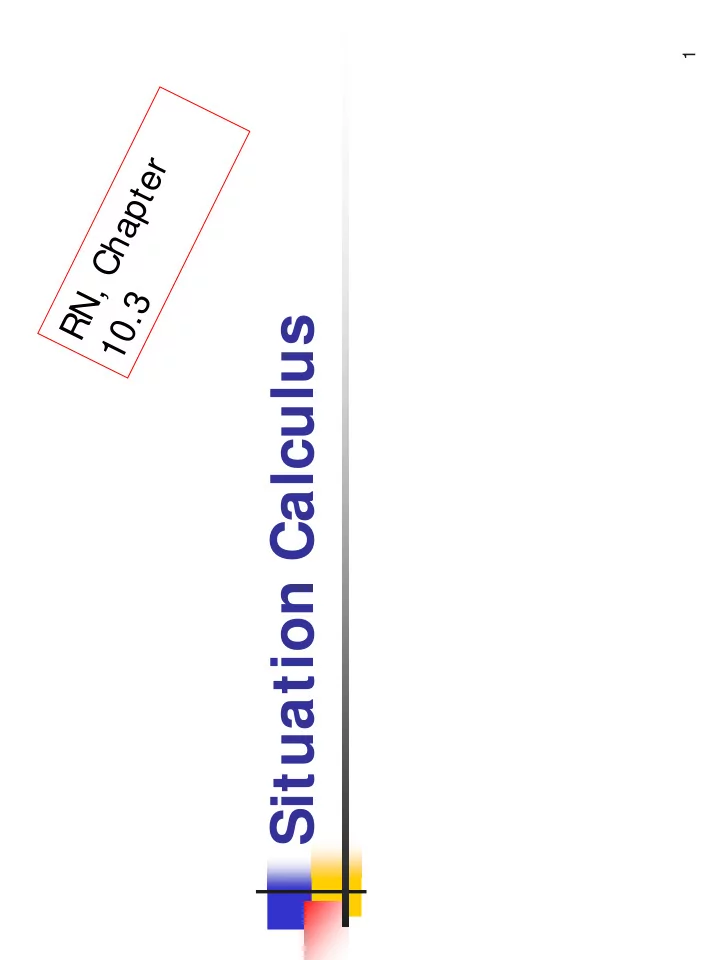

1 RN, Chapter 10.3 Situation Calculus
Logical Agents Reasoning [Ch 6] � Propositional Logic [Ch 7] � Predicate Calculus � Representation [Ch 8] � Inference [Ch 9] � Implemented Systems [Ch 10] � � Situation Calculus [Ch 10.3] Planning [Ch 11] � 2
3 Typical Wumpus World
Simple Reflex Agent � Rep'n: At time = t , specify Percept([s,b,g,u,c], t ) where s ∈ { Stench, –} , b ∈ { Breeze, –} , … � Eg Tell(KB, Percept( [Stench, –,Glitter, –, –], 3) ) � Connect percepts directly to actions: ∀ s, b, u, c, t Percept([s, b, Glitter, u, c], t) ⇒ Action( Grab; t ) � Or, more indirectly: ∀ s, b, u, c, t Percept([s, b, Glitter, u, c], t) ⇒ AtGold(t) ∀ t AtGold(t) ⇒ Action(Grab, t) � Q1: Which is more flexible? � Q2: Limitations of reflex approach? 4
5 Problem with Reflex Agents
6 Tracking a Changing World
7 Single-Time Knowledge Base
8 Problems with Single-Time KBs
9 Situation Calculus
10 Updating State, Based on Action
11 Computing Location
12 Interpreting Percepts
13 Deducing Hidden Properties
14 Using Information
Connecting Inferences to Actions � Rate Each Action ∀ r 1 , s WumpusAt(r 1 ) & LocationAhead(Agent, s) = r 1 ⇒ Deadly( Forward, s) ∀ , s OK(r 1 s) & LocationAhead(Agent,s) = r 1 & ¬ Visited(r 1 ,s) r 1 ⇒ Good(Forward, s) ∀ ,s ) ⇒ r 1 , s Gold(r 1 Great( Grab, s ) � Choose Best Action ∀ a, s Great(a, s) ⇒ Action(a, s) ∀ a, s Good(a, s) & ( ¬∃ b Great(b, s)) ⇒ Action(a, s) � Now, for each situation S, Ask( KB, ∃ a Action( a, S) ) . . . find a s.t. KB ⊨ Action( a, S ) 15
16 Propagating Information
17 Frame Axioms
Frame, and Related, Problems � Representational Frame Problem � Encoding what doesn't change, as actions take place � Solved via “success-state axioms” � Inferential Frame Problem � ... deal with long sequences of actions, .. Qualification Problem � � dealing with all qualifications � ... gold brick is not slippery, not screwed to table, ... � Ramification � When picking up the gold brick, also pick up the associated dust . . . 18
Goal-Based Agent � These rules sufficient to FIND gold Then what? � Need to change strategies: � Was “Find gold” � Now: “Get out!” ∀ s Holding(Gold, s) ⇒ GoalLocation( [ 1, 1 ], s ) Need to incorporate... How? 19
How to Plan? � Planning agents seek plan ≡ sequence of actions that achieve agent's goals. � Inference: Let logical reasoning system perform search: Ask(KB, ∃ a 1 , a 2 , a 3 , a 4 , a 5 , t t = Result(a 5 ;Result(a 4 ;Result(a 3 ;Result(a 2 ;Result(a 1 ; S 0 ))))) & Holding(Agent; Gold; t) & At(Agent;Outside; t) ) � Problematic, as � not easy to heuristically guide reasoning system. . . � What if > 5 actions required? � ... � Search: View actions as operations on KB, Goal = “KB includes Holding(Agent, Gold, t), At(Agent, Outside, t) )" � Planning: Special purpose reasoning systems… 20
Logical Agents � React to what it perceives � Extract abstract descriptions of current state from percepts � Maintain internal model of relevant aspects of world … even those not directly observable � Express and use info about desirability of actions in circumstances � Use goals in conjunction with knowledge about actions to construct plans � As all domain-specific knowledge is encoded as logical formulae, agent is completely generic! 21
Logic, Uncertainty, and Utility Advantages of Logic-Based Agents � High-level language for tracking environments. � Permits modular decomposition of state representation. Limitations of Simple Logic-Based Agents � Cannot track stochastic environments. � Cannot represent and reason with utilities – can't make tradeoffs 22
Limitations of Situation Calculus � Situation Calculus works well for Wumpus World But... � “Discrete Actions” Can't handle continuous actions � Flow of Electrons � Control of factory � . . . � Action at an “instant” What if actions have duration? � One action at a time � What if multiple agents? � What if world changes spontaneously? 23
Time and First-Order Logic � Representing & reasoning with dynamic / changing world is not strong point of first-order logic � Work on different logics: Eg dynamic logic / nonmonotonic logic � Nonmon: long struggle Yale shooting problem: � Actions: load gun / point gun / wait 5 seconds / fire gun � Question: Is target dead? (was gun loaded when fired) � > 100 research papers since 1986; still not fully resolved First-order Logic better at “static” information � 24
Recommend
More recommend